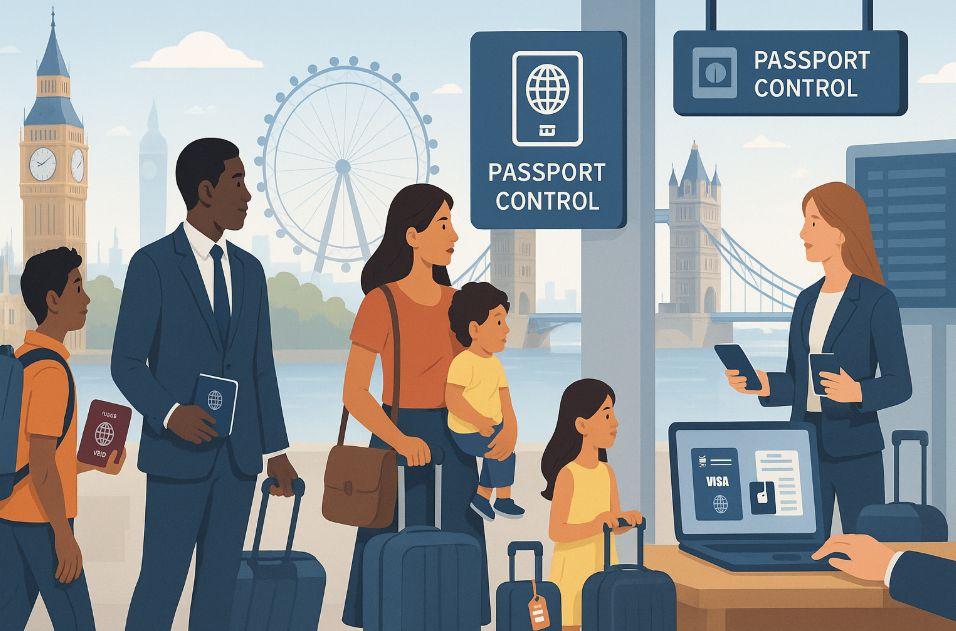Applying for UK immigration in 2025 remains one of the most significant steps for those seeking better opportunities, higher education, or to reunite with family in the United Kingdom.
The British immigration system continues to evolve with post-Brexit updates and technology-driven enhancements, yet the core process demands careful attention to eligibility, documentation, and the visa category that best fits an applicant’s circumstances.
Whether you’re planning to live, study, work, or start a business in the UK, understanding how to navigate the UK immigration process is essential. This guide will break down the process, address common questions, and explain what to expect at each stage.
What Are the Main Immigration Pathways to the UK in 2025?

In 2025, the UK continues to offer several immigration routes, catering to diverse profiles and intentions. The most popular remains the Skilled Worker Visa, ideal for individuals who have a confirmed job offer from a licensed UK employer. This visa is issued based on skill shortages, salary thresholds, and role eligibility.
Students can also pursue the Student Visa, which allows international learners to undertake degree-level education at recognised institutions. To qualify, applicants must show confirmation of acceptance and the ability to financially support themselves during their stay.
Another key category is the Family and Spouse Visas. These permit close family members or spouses of UK residents or citizens to join and live with them. Requirements include proof of relationship, financial capacity, and accommodation arrangements.
For aspiring entrepreneurs, the Innovator Founder Visa offers a route to start a unique, scalable business in the UK. Applicants must secure endorsement from an authorised body and demonstrate a viable business model.
Additionally, the Graduate Route allows former international students to stay in the UK for two years (or three years for doctoral graduates), while the Youth Mobility Scheme offers temporary residence for young individuals from eligible countries.
Who Is Eligible to Apply for UK Immigration?
Eligibility for UK immigration in 2025 largely depends on the specific visa category. However, there are general requirements that apply across the board. These include having a valid passport, a clean criminal record, and proof of funds to support oneself during the stay. The applicant must also meet the required level of English proficiency, proven through standard tests such as IELTS or equivalent qualifications.
Importantly, the UK operates on a points-based immigration system. This means candidates must accumulate a minimum number of points by satisfying criteria such as receiving a job offer, meeting salary thresholds, or holding relevant qualifications. While some routes have strict conditions, others, like family-based visas, may be more flexible in evaluating eligibility.
For some nationalities, additional steps may apply, including tuberculosis testing or extra verification. It is always advised to consult updated Home Office guidance before starting the application.
What Documents Are Required to Apply for a UK Visa in 2025?
When applying for a UK visa, submitting the correct documentation is a critical part of the process. Applicants must provide a valid passport with at least one blank page, recent photographs, and any previous visa or travel history.
Proof of financial stability is essential for almost all visa types. This might involve recent bank statements, payslips, or evidence of sponsorship from an employer or family member. Students, for example, need to demonstrate that they can pay tuition and living expenses, while workers must prove their salary meets UK standards.
Language proficiency documentation is also commonly required. Most applicants need to take a Secure English Language Test (SELT), such as IELTS for UKVI. Additionally, applicants may be asked to provide a criminal record certificate from their country of residence or any country where they have lived for more than 12 months.
Some categories, like the Skilled Worker Visa, may demand a Certificate of Sponsorship from a UK employer, while entrepreneurs must include their business plan and endorsement letter from an approved body.
How Do You Apply Online for a UK Visa?
The process of applying for a UK visa online in 2025 is designed to be efficient, but it requires attention to detail and accurate documentation. Here’s a step-by-step breakdown:
Step 1: Visit the Official UK Visa Application Website
Start your application on the official UK Government visa portal: www.gov.uk/apply-uk-visa. Choose the visa category that matches your reason for travel, such as work, study, or family reunion.
Step 2: Create an Account and Fill Out the Application Form
Register for an account on the website and complete the online application form. You’ll be asked to provide personal details, travel history, educational background, employment status, and your intended stay in the UK.
Step 3: Pay the Visa Application Fee and Immigration Health Surcharge (IHS)
After completing the form, you will be directed to pay the visa fee. Depending on the visa type, you may also need to pay the IHS, which allows you access to NHS healthcare services during your stay in the UK.
Step 4: Upload Supporting Documents
Prepare and upload the required documents. These typically include:
- A valid passport
- Recent passport-size photograph
- Bank statements or proof of financial support
- Proof of accommodation in the UK
- Letter of acceptance (for students) or Certificate of Sponsorship (for workers)
Step 5: Book an Appointment at a Visa Application Centre (VAC)
You’ll need to schedule an appointment at your nearest VAC to submit biometrics. The location and availability will depend on your country of residence.
Step 6: Attend the Biometrics Appointment
During your appointment, your fingerprints and a digital photograph will be taken. You may also be asked to submit original documents or your passport, which may be retained for processing.
Step 7: Wait for a Decision
After your appointment, your application is reviewed by UK Visas and Immigration (UKVI). Processing times vary by visa type and service level. Standard processing usually takes between 3 to 8 weeks.
Step 8: Receive Your Visa Decision
You’ll be notified by email once a decision has been made. If approved, your visa vignette will be attached to your passport, allowing you to travel to the UK.
Step 9: Collect Your Biometric Residence Permit (BRP)
After arrival in the UK, collect your BRP from the designated post office or your sponsor’s address within 10 days. This is your official proof of legal residence in the UK.
What Are the UK Visa Fees and Processing Times in 2025?

The cost of applying for a UK visa varies depending on the visa type and service speed. For instance, the Skilled Worker Visa may cost between £719 and £1,423, depending on the duration and whether dependants are included. The standard fee for a Student Visa remains at £490, while a Spouse or Partner Visa costs approximately £1,846.
Optional services such as Priority and Super Priority can significantly reduce the waiting period. Priority services typically process visas within five working days, while Super Priority offers a 24-hour turnaround in select locations. These come with additional charges ranging from £500 to £800.
Here’s a breakdown of typical visa fees:
| Visa Type | Standard Fee | Priority Fee |
| Skilled Worker | £719–£1,423 | £500 |
| Student Visa | £490 | £500 |
| Spouse/Partner Visa | £1,846 | £573 |
| Innovator Founder | £1,036 | £500 |
| Graduate Route | £822 | N/A |
Standard processing times can range from three to eight weeks, depending on the country of application and visa complexity.
Can You Switch Visa Types While in the UK?
Yes, the UK immigration system allows certain visa holders to switch from one visa category to another while already residing in the country. For instance, a student who graduates from a UK university can apply to switch to the Skilled Worker Visa if they receive a job offer from a licensed sponsor.
However, not all visas permit switching. Individuals on a visitor visa generally cannot switch to another visa category without leaving the UK. It’s also important to ensure that the conditions of the original visa are not breached while applying for a new one.
Switching visas requires submitting a fresh application through the online portal, including updated documents and payment of new visa fees. The applicant must remain in the UK while the application is being processed and must not travel outside the country during this period.
How Can Employers Sponsor Immigrants to the UK?
UK-based employers can sponsor foreign nationals by becoming a licensed sponsor under the Skilled Worker scheme. To qualify, a company must operate legally in the UK, have systems in place to monitor employees, and pass background checks conducted by UKVI.
Once licensed, the employer can issue a Certificate of Sponsorship (CoS) to the applicant. This document is a reference number that must be included in the visa application and confirms details of the job offer, salary, and working conditions.
Sponsoring an employee also comes with ongoing responsibilities. Employers must report absences, changes in employment, or any compliance issues. Failure to meet these obligations can result in penalties or loss of sponsorship privileges.
What Are the Common Reasons for UK Visa Refusals?

Visa applications are often refused due to errors or insufficient documentation. A common reason includes missing or incorrect financial statements, leading the Home Office to believe the applicant cannot support themselves.
Another frequent issue is not meeting the English language requirement. Test results must be current and from an approved testing provider. In some cases, relationship proof or sponsorship documents may not meet the criteria, especially in partner or family-based applications.
Misrepresentation or providing false information is also taken seriously and can lead to long-term bans. Therefore, accuracy and honesty throughout the application process are crucial.
How Can You Appeal a Refused UK Visa Application?
If a visa application is refused, applicants may have the right to appeal or request an administrative review. An administrative review involves asking UKVI to reassess the decision, especially if there’s a belief that an error was made during evaluation.
For more complex cases or where the applicant believes the decision violates human rights or legal grounds, an appeal can be made to the Immigration Tribunal. This involves presenting the case before an independent judge, and in many cases, hiring an immigration solicitor improves the chances of success.
The appeal process may take several weeks to months, and it’s vital to act promptly and follow the timelines provided in the refusal letter.
What Happens After Your UK Immigration Application Is Approved?
Once the visa is approved, applicants receive a confirmation letter and are required to collect their Biometric Residence Permit (BRP) within ten days of arriving in the UK. The BRP serves as proof of legal residence and is necessary for employment, banking, and healthcare access.
After entering the UK, individuals must comply with visa conditions. This includes working only in authorised roles, attending educational courses if on a student visa, and renewing or switching visas as needed.
Many visa categories offer a pathway to settlement. After five years of continuous lawful residence, individuals may apply for Indefinite Leave to Remain (ILR), which offers permanent residence rights.
How Can You Stay Updated with UK Immigration Changes?

Since immigration policies are subject to change, it’s essential to stay informed. The best source for updates is the UK Government’s official immigration site. Other trusted platforms such as Free Movement, ILPA UK, and regulated immigration solicitors often publish timely insights.
Individuals can also subscribe to GOV.UK email alerts for updates on specific visa types. This is especially helpful for those planning to apply in the near future or who need to monitor policy changes affecting their current visa.
Is It Worth Hiring an Immigration Lawyer in 2025?
While many people successfully apply for visas on their own, hiring an immigration lawyer is advisable for more complex cases. These professionals offer guidance on documentation, deadlines, and appeal processes, reducing the likelihood of rejection.
When choosing legal support, it’s important to ensure the lawyer or consultant is registered with a recognised regulatory body, such as the Office of the Immigration Services Commissioner (OISC).
Though hiring a lawyer can add to the cost, it often saves time and stress, especially in cases involving family reunification, business immigration, or prior refusals.
Conclusion
Applying for UK immigration in 2025 involves navigating a structured yet accessible system tailored to workers, students, families, and entrepreneurs. By understanding the right visa pathway, preparing accurate documentation, and staying informed on UKVI updates, applicants can significantly improve their chances of success.
Whether you apply independently or seek legal guidance, a clear understanding of the process is key to making your move to the UK smooth and successful.
FAQs About Applying for UK Immigration
How early should someone apply for a UK visa before travel?
Applications can usually be submitted up to three months before the intended travel date.
Can international students work part-time during studies?
Yes, student visa holders are allowed to work limited hours during term time and full-time during holidays.
Are there age restrictions for any visa categories?
Most visas do not have an upper age limit, but age can impact eligibility under certain routes like Youth Mobility.
How long does a UK visa decision take?
Processing times vary, but most standard visas are decided within 3 to 8 weeks.
Can dependants join the main applicant on a UK visa?
Yes, most work and study visas allow eligible dependants to apply simultaneously.
What options are available after a visa is refused?
Applicants can request an administrative review or file an appeal, depending on the visa type.
Is health insurance required for UK visa applicants?
Applicants must pay the Immigration Health Surcharge to access NHS services during their stay.









Leave feedback about this